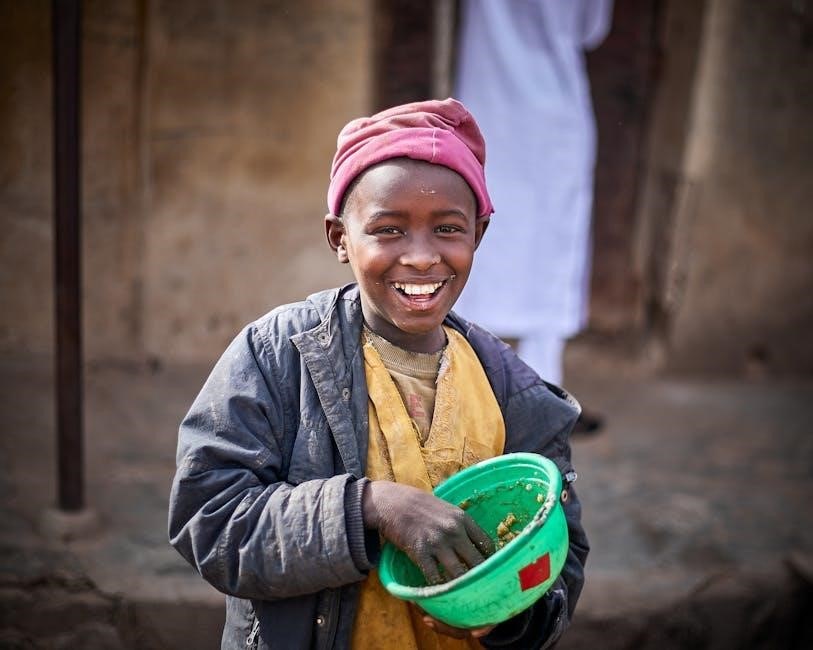Strategic thinking is crucial for navigating challenges and opportunities in personal and professional growth. “Your Next 5 Moves PDF” offers a roadmap for planning and achieving success.
1.1 The Importance of Strategic Thinking in Personal and Professional Growth
Strategic thinking is the cornerstone of personal and professional growth, enabling individuals to navigate complexities, anticipate opportunities, and make informed decisions. It fosters clarity, direction, and resilience, allowing individuals to align their actions with long-term goals. By cultivating strategic thinking, one can better understand their strengths, weaknesses, and the ever-changing landscape of their environment; This mindset not only enhances problem-solving skills but also promotes adaptability, crucial for thriving in uncertain times. In both personal and professional contexts, strategic thinking empowers individuals to set priorities, allocate resources effectively, and stay focused on what truly matters. It is through strategic thinking that one can transform ambitions into actionable plans, ensuring steady progress toward desired outcomes. The “Your Next 5 Moves PDF” guide emphasizes this principle, providing a framework to harness its power for sustained success.
1.2 Overview of the “Your Next 5 Moves PDF” Guide
The “Your Next 5 Moves PDF” guide is a comprehensive roadmap designed to help individuals and professionals strategically plan their next steps toward success. It provides actionable insights, practical tools, and frameworks to align goals with tangible outcomes. The guide emphasizes the importance of forward-thinking, offering strategies to anticipate challenges and capitalize on opportunities. With a focus on simplicity and effectiveness, it equips readers with the skills to break down complex objectives into manageable actions. Whether for personal development or career advancement, this guide serves as a versatile resource, ensuring clarity and direction in pursuit of long-term aspirations. By leveraging its principles, individuals can create a clear, results-driven path to achieving their vision.

Key Principles of Strategic Planning
Strategic planning relies on clear vision, alignment of goals, and adaptability. It emphasizes understanding strengths, weaknesses, and opportunities to create actionable plans that drive progress and success.

2.1 Setting SMART Goals for Success
Setting SMART goals is a cornerstone of effective strategic planning. SMART stands for Specific, Measurable, Achievable, Relevant, and Time-bound. By defining clear objectives, individuals and professionals can create a roadmap for success. Specific goals eliminate ambiguity, ensuring everyone understands what needs to be accomplished. Measurable outcomes allow for tracking progress, providing motivation and accountability. Achievable goals are realistic and aligned with available resources, fostering confidence. Relevant goals ensure alignment with broader priorities, preventing wasted effort. Time-bound goals establish deadlines, driving focus and commitment. Adhering to the SMART framework helps overcome obstacles, maintain momentum, and achieve long-term success. It’s a powerful tool for turning vision into actionable steps.
2.2 Understanding Self-Awareness and Adaptability
Self-awareness and adaptability are essential for effective strategic planning. Self-awareness involves understanding your strengths, weaknesses, values, and motivations, enabling better decision-making. Adaptability allows you to respond to changes and challenges, ensuring resilience in dynamic environments. Together, these qualities help individuals anticipate obstacles, pivot strategies, and stay aligned with their goals. By cultivating self-awareness, you can identify areas for improvement and leverage your strengths. Adaptability ensures that you remain flexible, embracing opportunities and navigating uncertainties with confidence. These traits are critical for long-term success, as they foster continuous growth and the ability to thrive in evolving circumstances.
Strategic Planning: Breaking It Down
Strategic planning simplifies complexity, clarifies direction, and turns strategies into actionable steps, ensuring resources and efforts align with clear, achievable objectives.

3.1 How to Break Down Big Goals into Manageable Steps
Breaking down big goals into manageable steps is essential for clarity and execution. Start by identifying the main objective and then divide it into smaller, actionable tasks. Use a timeline to organize these steps, ensuring each task builds progressively toward the final goal. Prioritize tasks based on importance and urgency, and allocate resources effectively. Regularly review and adjust the plan to stay on track. This approach reduces overwhelm, enhances focus, and increases the likelihood of success. By creating a clear roadmap, you can tackle complex goals with confidence and precision.
3.2 Identifying Opportunities and Leveraging Them
Identifying opportunities is a cornerstone of strategic planning, enabling individuals to capitalize on favorable circumstances. Cultivate a proactive mindset to recognize potential openings, whether in personal growth, career advancement, or business expansion. Leverage these opportunities by aligning them with your goals and resource availability. Effective execution involves assessing the feasibility and potential impact of each opportunity. Utilize networks, skills, and knowledge to maximize outcomes; Stay adaptable to seize emerging possibilities and adjust strategies accordingly. By systematically identifying and leveraging opportunities, you can create a competitive edge and drive meaningful progress toward your objectives.
3.3 Prioritizing Actions and Creating a Clear Plan
Prioritizing actions is essential for effective strategic execution, ensuring focus on what truly matters. Use frameworks like the Eisenhower Matrix to distinguish between urgent and important tasks. Break down large objectives into smaller, actionable steps, aligning each with your long-term vision. Create a clear, structured plan with defined timelines and resource allocation to maintain direction. Regularly review and adjust your priorities to adapt to changing circumstances. A well-organized plan not only enhances efficiency but also reduces overwhelm, helping you stay focused on your goals. By systematically prioritizing and planning, you can transform your strategy into tangible results, driving continuous progress toward your aspirations.

Essential Tools and Resources
Essential tools and resources empower strategic planning, enhancing productivity and organization. Templates, software, and journals are vital for structuring ideas and tracking progress effectively.
4.1 Using Mind Mapping for Creative Strategy Development
Mind mapping is a powerful tool for creative strategy development, allowing individuals to visually organize ideas and concepts. By starting with a central goal, users can branch out into related objectives, actionable steps, and potential obstacles. This method enhances creativity, clarifies priorities, and fosters a deeper understanding of interconnections between strategies. It is particularly effective for brainstorming sessions, helping to identify opportunities and threats while structuring plans cohesively. Incorporating colors, images, and keywords makes mind maps engaging and memorable. Regularly reviewing and updating these visual representations ensures alignment with evolving goals and adapts to new challenges. Mind mapping is a flexible, intuitive resource that complements strategic planning, making it easier to stay focused and innovative in pursuit of success.
4.2 Implementing Effective Time Management Techniques
Effective time management is essential for executing strategic plans successfully. Techniques like prioritization, time blocking, and the Pomodoro Technique help maximize productivity while minimizing distractions. Prioritizing tasks based on urgency and impact ensures focus on high-value activities. Time blocking allocates specific periods for tasks, enhancing concentration and efficiency. The Pomodoro Technique promotes balanced work and breaks, maintaining mental freshness. Additionally, leveraging tools like calendars, task lists, and productivity apps can streamline scheduling and tracking progress. Consistently reviewing and adjusting time management strategies ensures alignment with changing priorities and goals. By mastering these techniques, individuals can optimize their schedules, reduce stress, and achieve their objectives more effectively, ultimately supporting their strategic plans.

Overcoming Obstacles
Overcoming obstacles requires resilience, adaptability, and a proactive mindset. Identifying challenges early, staying flexible, and maintaining focus on long-term goals are key to navigating setbacks successfully and sustainably.
5.1 Anticipating Challenges and Developing Contingency Plans
Anticipating challenges is a critical component of strategic planning. By identifying potential obstacles early, you can develop contingency plans to mitigate risks and maintain momentum. This involves analyzing potential roadblocks, such as market shifts, resource constraints, or unexpected competition. Effective contingency planning ensures that you have alternative strategies ready to implement if your primary approach falters. Proactive preparation not only reduces stress but also positions you to capitalize on opportunities that arise from unforeseen circumstances. Regularly reviewing and updating your contingency plans keeps them relevant and actionable. This mindset of preparedness is essential for navigating the uncertainties of personal and professional growth, ensuring that you remain adaptable and resilient in the face of challenges.
5.2 Building Resilience to Stay on Track
Building resilience is essential for maintaining momentum in strategic planning. It enables individuals to navigate setbacks, adapt to changing circumstances, and stay committed to their goals. Resilience involves developing a mindset that embraces challenges as opportunities for growth rather than obstacles. By fostering self-awareness, emotional stability, and a problem-solving attitude, you can better withstand adversity. Learning from failures and incorporating these lessons into future strategies strengthens resilience. Additionally, maintaining a support network and engaging in self-care practices can enhance your ability to bounce back. Resilience is not about avoiding setbacks but about responding to them effectively. Cultivating this trait ensures that you remain focused and motivated, even when faced with unexpected difficulties, ultimately driving long-term success.

5.3 Learning from Failure and Adjusting Strategies
Learning from failure is a cornerstone of effective strategic planning. Every setback provides valuable insights that can refine and strengthen your approach. By analyzing what went wrong, you can identify gaps in your strategy and make necessary adjustments. Resilience plays a key role here, as it enables you to bounce back and adapt. Embracing failure as a learning opportunity fosters growth and improves decision-making. Instead of viewing mistakes as final outcomes, they become stepping stones toward success; This mindset allows you to tweak your plans dynamically, ensuring alignment with your goals. Continuous improvement through failure analysis ensures that your strategies remain relevant and effective, helping you stay on track despite challenges.

Sustaining Momentum
Sustaining momentum involves consistently tracking progress and staying motivated, ensuring long-term success by maintaining focus and adapting strategies as needed to overcome challenges and stay on course.
6.1 The Importance of Tracking Progress
Tracking progress is essential to maintaining momentum and achieving long-term success. By regularly monitoring achievements and setbacks, individuals can make informed decisions and adjust strategies accordingly. This practice ensures alignment with goals, helps identify areas for improvement, and fosters accountability. Consistent tracking also builds motivation, as visible progress reinforces commitment and encourages continued effort. Without monitoring, it becomes easy to lose direction or overlook critical adjustments needed to stay on course. Implementing a structured system to track progress, such as setting milestones or using KPIs, creates clarity and ensures that efforts remain focused and productive. Ultimately, tracking progress is a cornerstone of sustained success, enabling individuals to adapt and thrive in dynamic environments.
6.2 Strategies to Stay Motivated and Focused
Staying motivated and focused is vital for long-term success. Setting clear, actionable goals helps maintain direction and purpose. Celebrating small wins can boost morale and reinforce progress. Surrounding oneself with a supportive network and maintaining a positive mindset are equally important. Creating a structured routine and eliminating distractions can enhance focus. Additionally, practicing self-care, such as adequate rest and exercise, ensures mental and physical energy. Regularly reflecting on accomplishments and adjusting plans keeps motivation high. Embracing challenges as opportunities for growth rather than obstacles fosters resilience. By combining these strategies, individuals can maintain their drive and concentration, ensuring steady progress toward their objectives. Consistency and adaptability are key to sustaining motivation and focus over time.

Real-World Applications
Strategic planning, as outlined in “Your Next 5 Moves PDF,” can be applied across industries to unlock potential and drive success. By implementing actionable strategies, individuals and businesses can achieve measurable results, enhance productivity, and stay competitive in dynamic environments. Real-world applications demonstrate how strategic thinking leads to innovation, growth, and sustained progress. These principles empower individuals to navigate challenges and seize opportunities effectively, ensuring long-term success and fulfillment.
7.1 Case Studies of Successful Strategy Implementation

Case studies offer real-world insights into how individuals and businesses have successfully applied the strategies outlined in “Your Next 5 Moves PDF.” Entrepreneurs, corporate teams, and professionals share their experiences of breaking down big goals into actionable steps, leveraging opportunities, and creating contingency plans. These stories highlight how strategic thinking transformed challenges into successes. For instance, a startup used the guide’s principles to scale its operations, while a seasoned executive navigated career transitions effectively. Each case study underscores the importance of adaptability, resilience, and clear planning. By learning from these examples, readers gain practical insights to apply the “Next 5 Moves” framework in their own journeys, ensuring measurable results and long-term success.
7.2 Applying the “Next 5 Moves” in Different Industries
The “Next 5 Moves” framework is versatile, offering value across various industries. In technology, it helps innovators scale and adapt to rapid changes, while in healthcare, it enables organizations to improve patient care and operational efficiency. Entrepreneurs in retail use the guide to refine marketing strategies and enhance customer experiences. Professionals in finance leverage its principles to make data-driven decisions and manage risks effectively. Each industry benefits from the core strategies of setting clear goals, identifying opportunities, and staying adaptable. By tailoring the framework to their unique challenges, leaders across sectors achieve measurable results and sustainable growth. This adaptability makes “Your Next 5 Moves PDF” a powerful tool for success in any field.
The “Your Next 5 Moves PDF” provides clear strategies for personal and professional growth, enabling readers to overcome challenges and achieve lasting success effectively every day.
8.1 Recap of Key Takeaways
The “Your Next 5 Moves PDF” emphasizes the importance of strategic thinking, SMART goal setting, and self-awareness to navigate personal and professional challenges. By breaking down big goals into manageable steps and leveraging opportunities, individuals can create clear, actionable plans. Tools like mind mapping and effective time management enhance strategy development, while resilience and adaptability help overcome obstacles. Learning from failures and adjusting strategies ensures continuous growth. The guide underscores the value of tracking progress and staying motivated to sustain momentum. Real-world applications across industries demonstrate the versatility of these strategies. Ultimately, the guide equips readers with a practical framework to plan their next moves confidently, ensuring long-term success and fulfillment in both personal and professional realms.
8.2 Final Thoughts on Implementing Your Next 5 Moves
Implementing your next 5 moves requires a blend of strategic thinking, adaptability, and consistent action. The guide provides a clear roadmap, but success lies in execution. Balancing planning with flexibility ensures you adapt to changing circumstances while staying focused on your goals. Embrace challenges as opportunities for growth and remain resilient in the face of setbacks. By leveraging tools like mind mapping and time management, you can maximize efficiency and maintain momentum. Ultimately, the “Your Next 5 Moves PDF” empowers you to take control of your future, whether in personal or professional realms. Remember, strategic planning is a continuous process, and staying proactive will lead to long-term success and fulfillment.






























